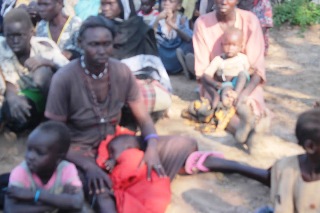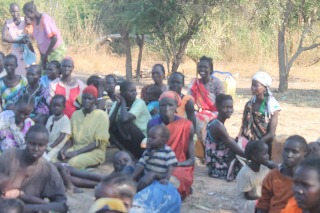South Sudan: 900 displaced by Sudan air attacks
November 26, 2012 (JUBA) – Bombing of South Sudan’s Northern Bahr El Ghazal State, allegedly carried out by Sudanese warplanes over three days last week, has displaced more than 900 people in Aweil North County, officials said on Sunday.

A senior official in the Northern Bahr el Ghazal State government said Sunday that the bombing of the area from Tuesday until Thursday last week is linked to the ‘Mile 14 ‘ area being included in a proposed demilitarised buffer zone along the disputed international border, which was agreed in September under African Union mediation.
The Commissioner of Aweil North County, Kuol Athuai Hal, said thousands of terrified civilians have deserted their villages and started fleeing towards the state capital, Aweil, following bombings between 20 and 22 November. Seven people have been killed, according to the Commissioner.
Hal told Sudan Tribune on Sunday that 900 displaced people had arrived in the Gokmachar and are “in need of a lot of things”, adding that South Sudan’s army (SPLA) are deployed in all the villages around Kiir Adem to ensure the protection of the population.
The SPLA accused the Sudanese army on Friday of amassing troops on the border and moving towards their positions in some areas.
South Sudan’s, Minister of Information, Benjamin Marial, described the bombings as a “wanton and malicious” on Sunday.
“Civilians are not like soldiers. They do not know techniques to avoid being hit by the bombs. They just run whenever they hear sound of the warplanes”, Marial said.
There have been no reports of bombings since Thursday but local officials say SAF planes circled the area on Friday in an attempt to further intimidate the population.
Marial, said that the South Sudanese government were commitment to provide security and protection to the citizens in the area.

Although both sides agreed to withdraw 10km either side of a notional, non-binding line proposed by the AU, the security elements of the deal have not been implemented and it has faced stern criticism in South Sudan where many see Mile 14’s inclusion as a recognition that the area in disputed. There are many areas claimed by both sides along the 1,800km border, which came into being in July last year when South Sudan seceded as part of a 2005 peace deal.
South Sudan said that Sudan Armed Forces (SAF) planes started bombing the area of Kiir Adem on Tuesday killing seven people. According to the Secretary General of the Northern Bahr el Ghazal State government, Garang Kuot Kuot, the bombing campaign is “a tactic” to instigate the “forceful displacement” of the civilian population in order to pave way for SAF to occupy the area.
“After three days of consecutive, indiscriminate aerial bombardment, there was, and still is, wider panic among civil population in the area. Causing wide spread fear among civil population is the ultimate aim of Khartoum Government. The most likely calculation among Khartoum planners and strategists is that civil population will eventually be forced to leave their homes, paving way for Khartoum to entrench its control over the area and eventually settles its Messeria and Rezeigat nomads there.”
Kuot said that Khartoum hoped that by bombing Kiir Adem the Cooperation Agreement, signed in September, would unravel.
The Northern Bahr el Ghazal official, repeated South Sudan’s claim that Khartoum has introduced “impossible” additional demands, including asking the SPLA to disarm their former comrades in South Kordofan and Blue Nile since last year.
Sudan’s defence minister on the other hand, has blamed Juba for the failure implement the deal. Khartoum is not satisfied that the SPLA has completely sever its ties with the SPLA-North in the Two Areas and has refused to allow oil exports through its territory to resume until security issues are resolved..

Kuot said described last weeks bombing campaign, as “usual act of aggression” by the Khartoum government. In April the two sides nearly returned to all-out conflict over another disputed area – Heglig/Panthou. South Sudan’s army occupied the key oil area for ten-days during the fighting,which Juba says was triggered by air and ground attacks by SAF.
On that occasion SAF’s bombing went as far into South Sudanese territory as Bentui, the capital of Unity State. On the that occasion, the United Nations witnessed and reported the attack.
(ST)
